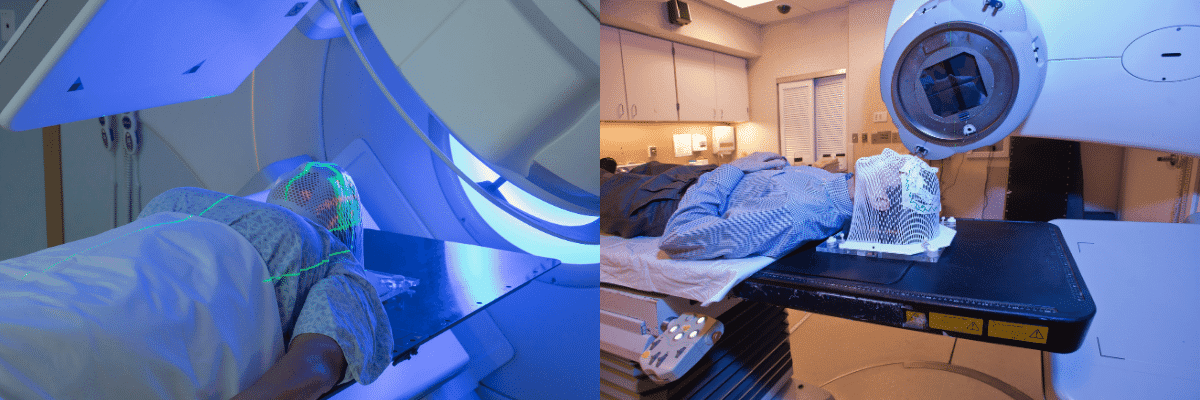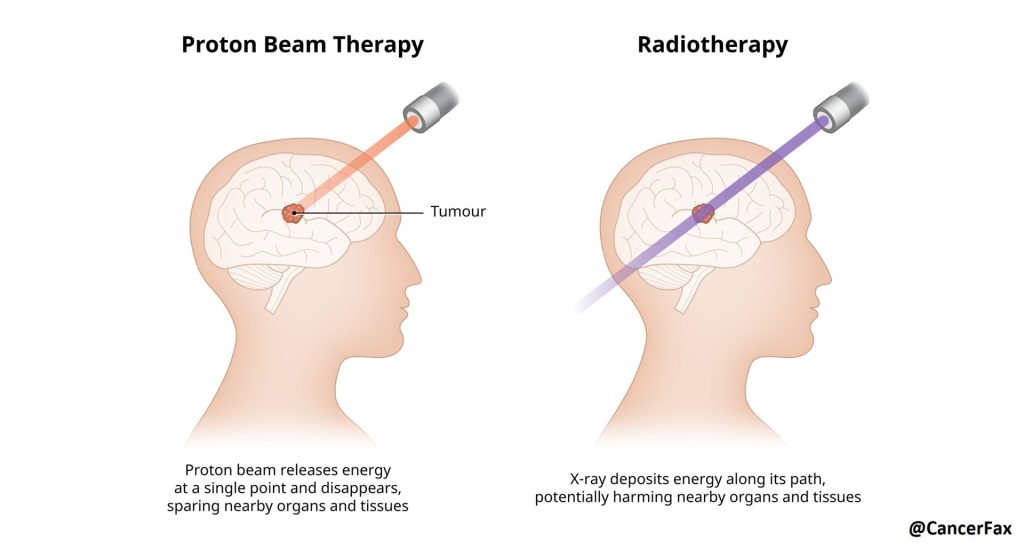Register For Proton Therapy In Singapore
Looking for proton therapy in Singapore?
Secure your spot for advanced cancer treatment in the best hospital.
Proton Therapy in Singapore is an advanced way to treat cancer using positively charged protons. Unlike regular treatments, it’s more precise and has fewer side effects. It works best for tumors that haven’t spread to other sections of the body. Rather than X-rays, it uses unique protons that do not scatter as they pass through the body. This means they concentrate their attention right on the cancer while protecting nearby healthy tissues. This targeted approach speeds up recovery and reduces side effects like feeling sick or tired. Modern proton therapy services are provided by some of the top cancer hospitals. Proton therapy in Singapore is a modern solution that helps people with cancer get better while improving their overall quality of life during treatment. It’s a significant advancement in cancer treatment, making the journey to recovery easier for patients.
If your oncologist thinks that you need a more advanced treatment to combat cancer disease they will ask you to undergo CAR T cell therapy in Singapore which increases the chances of your survival even more.
Proton therapy in Singapore – Introduction
One of Asia’s largest integrated private healthcare groups, IHH Healthcare, and IBA (Ion Beam Applications S.A., EURONEXT), the world’s leading provider of proton therapy solutions for the treatment of cancer, announced today that they have signed a contract for the installation of a small single-room proton therapy system, Proteus®ONE*, at IHH flagship hospital in Singapore. For IBA, the contract is worth between 35 and 40 million euros (SGD 55 and 65 million).
IHH chose the IBA Proteus®ONE solution following a thorough selection procedure. The Proteus®ONE solution, IBA’s most recent Pencil Beam Scanning (PBS) technology, isocenter volumetric imaging (Cone Beam CT) capabilities, and the structure that will house the proton therapy facility are all covered by the deal. A different agreement governs the facility’s long-term operation and upkeep. The facility has started its operations and is open for patients to register.

Modern radiation therapy known as proton therapy has attracted a lot of interest in the field of oncology. It employs charged protons to precisely target cancer cells with the least amount of harm to normal tissues surrounding the tumor. Proton therapy has been popular in Southeast Asia, especially in Singapore, which is regarded as having a high-quality healthcare system. This development gives cancer patients in the area hope and better treatment alternatives.
Delivering highly targeted radiation to tumors is one of the main benefits of proton treatment, which lowers the chance of adverse effects and long-term difficulties. This is especially important when treating tumors that are close to essential organs or when treating children because radiation exposure must be kept to a minimum.
Singapore is home to cutting-edge proton therapy facilities that are outfitted with cutting-edge technology and highly qualified medical staff. These facilities, such as the National Cancer Centre Singapore and the Singapore Proton Therapy Centre, provide complete cancer care and work in conjunction with prestigious worldwide organizations to guarantee the best standards of care.
For cancer patients, the availability of proton treatment and cost of proton therapy in Singapore has changed everything. It offers patients with difficult-to-treat cancers new hope by delivering an alternative to conventional radiation therapy and surgery. Additionally, Singapore’s healthcare system’s interdisciplinary approach guarantees that patients receive individualized treatment programs that may combine therapies like surgery, chemotherapy, and proton therapy to meet their unique needs.
Additionally, Singapore’s proactive approach to research and innovation helps to develop proton treatment on a constant basis. The nation makes investments in clinical trials and joint research initiatives, enhancing its experience and understanding in this specialized field.
In conclusion, proton therapy has transformed the way that cancer is treated in Singapore by giving patients a precise and powerful tool to fight tumors. Singapore is at the vanguard of this ground-breaking therapy, providing new opportunities for cancer patients not only in the nation but also in the larger region, thanks to its cutting-edge facilities and dedication to research.
Key Differences Between Traditional Radiotherapy And Proton Therapy
Proton therapy differs from traditional radiotherapy in several ways, having a substantial impact on the effectiveness and side effects of cancer treatment in Singapore. Proton treatment, which precisely targets tumor tissue while preserving nearby healthy cells, can limit radiation exposure to healthy tissues by up to 60%. Unlike standard radiation, which includes X-rays depositing energy along their course, proton treatment allows doctors to control when and where proton energy is released. This ensures that cancer cells suffer the greatest amount of damage while causing the least amount of injury to nearby tissues. Traditional radiation raises concerns regarding post-treatment health implications since its exit dose affects tissue outside the tumor. The ability of proton therapy to deliver a larger radiation dose without damaging important organs makes it a compelling alternative, perhaps outweighing the cost of proton therapy in Singapore.
Factors Affecting The Cost Of Proton Therapy In Singapore
The cost of proton therapy in Singapore can be around $100,000 for approximately 30 treatment sessions. However, it depends on various factors which are as follows –
A. Treatment Duration And Frequency
The proton therapy cost Singapore is affected by how long it takes and how frequently it is required. Longer treatment durations or more frequent sessions may result in higher costs. These are determined by doctors based on the type and stage of cancer.
B. Equipment And Technology
The cost of the machines and technologies used in proton treatment affects the overall proton beam therapy Singapore cost. Although more expensive, advanced equipment often enables more precise and effective therapy, resulting in positive outcomes.
C. Medical Team Expertise
The proton beam therapy cost Singapore is determined by the experience and expertise of the medical team involved. Although highly skilled specialists charge higher fees, their expertise and proficiency contribute to the treatment’s effectiveness, ensuring you may receive the finest care possible.
Best Hospitals For Proton Therapy In Singapore
Parkway Cancer Center
Parkway Cancer Centre is a world-class cancer treatment centre that specializes in advanced proton therapy. The center has modern technology for effective cancer treatment as they have partnered with a top provider of proton therapy systems. They use this technology to provide precise proton therapy, especially for tricky areas like the spine and brain. This technique minimizes damage to healthy tissues, resulting in more effective treatment with fewer side effects. Parkway Cancer Centre is committed to providing top-notch cancer care, ensuring that patients receive the best and most up-to-date therapies.
National Cancer Center Singapore
The National Cancer Centre Singapore (NCCS) is a world-class cancer treatment facility that is making a significant impact with proton beam therapy Singapore. They’ve set up a unique program for Proton Beam Therapy (PBT), an advanced treatment for cancers near vital organs and in children. NCCS is working with Hitachi to bring Southeast Asia’s first proton beam therapy, ensuring they stay ahead in providing the best care possible. This therapy shows NCCS’s commitment to giving patients the latest and greatest treatments. With their dedication and ongoing research, NCCS is leading the way in offering top-notch proton therapy in Singapore.
How To Book An Appointment For Proton Therapy In Singapore?
Send your reports
Send your medical summary, latest blood reports, biopsy report, latest PET scan report, and other available reports to info@cancerfax.com or WhatsApp at +1 213 789 56 55.
Evaluation & Opinion
Proton therapy specialists will analyze the reports and suggest if the patient is fit for proton therapy. We will also get you an estimate of expenses and other related costs.
Medical visa and travel
We will get you a medical visa to Singapore and arrange for travel for treatment. Our representative will receive you at the airport and escort you during your treatment.
Treatment
Our representative will help you with doctor appointments and other necessary formalities locally. He will also help you with any other local help required.
What Is Proton Beam Therapy?
Proton therapy, commonly referred to as proton beam therapy, is a sophisticated radiation therapy used in the treatment of cancer. Proton beam therapy, in contrast to conventional radiation therapy, which uses X-rays, uses charged protons to precisely target cancer cells while minimizing harm to nearby healthy tissues. Radiation oncology is being transformed by this innovative technology, which has drawn wide attention.
The primary benefit of proton beam therapy is its capacity for precise radiation delivery. The Bragg peak, a peculiar physical characteristic of protons, enables them to concentrate the majority of their energy precisely at the tumor site while preserving healthy tissues outside the target region. Because of this property, proton beam treatment is especially well-suited for treating cancers close to vital structures or in young patients.
It also greatly lowers the likelihood of adverse effects and complications that are associated with conventional radiation therapy. Its ability to boost therapeutic effectiveness is a further noteworthy benefit. Oncologists may deliver stronger radiation doses directly to malignant cells thanks to the precision targeting capabilities of proton beams, which increases the possibility of tumor control and enhances patient outcomes. Additionally, to increase the overall efficacy of cancer treatment, proton therapy can be used in conjunction with other treatment modalities like surgery or chemotherapy.
Even though proton beam therapy has many advantages, it is important to recognize some restrictions. The technology is more expensive than traditional radiation therapy since it needs a costly infrastructure and specialized equipment. Additionally, there might not be many facilities offering proton therapy, necessitating patient travel for care.
Proton beam therapy represents a significant advancement in the fight against cancer despite these difficulties. It is a crucial weapon in the fight against cancer because of its accuracy, diminished side effects, and potential for better results. The potential for expanding access and improving the technology in this area holds promise for ensuring that more patients can make use of this great therapeutic method.

You may like to read: Cancer treatment in the USA
What Are The Benefits Of Proton Beam Therapy?
In contrast to conventional radiation therapy techniques, proton therapy has several advantages. Some of the main benefits are as follows:
Targeting with Extreme Precision: Proton treatment enables extremely precise targeting of malignancies. The majority of the radiation dose that protons emit is directed directly to the tumor location when they are controlled to halt at a specified depth within the body. This precision lessens harm to neighboring healthy tissues, lowering the possibility of problems and side effects.
Exposure: Proton treatment lowers radiation exposure to healthy tissues and organs that are located outside of the tumor when compared to conventional radiation therapy. When treating cancers close to important structures like the brain, spinal cord, or heart, where limiting radiation damage is essential, this is very useful.

Enhanced Treatment Efficacy: Oncologists can give cancer cells larger radiation doses since they can accurately target tumors with protons. Better patient outcomes may result from this higher radiation dose’s potential to increase the effectiveness of the therapy and the likelihood that the tumor will be controlled.
Pediatric-Friendly: Patients with cancer in children benefit greatly from proton therapy. Children are particularly susceptible to the effects of radiation, and proton therapy’s precision helps to reduce any potential long-term side effects on developing tissues. Later in life, it lowers the risk of developing secondary malignancies.
Reduced Treatment-Related Side Effects: Proton therapy can considerably lessen treatment-related side effects by shielding healthy tissues from unwanted radiation. This can result in a higher quality of life both during and after treatment, making it easier for patients to carry out their regular daily activities.
Combination with Other Therapies: To develop a thorough treatment strategy, proton therapy can be successfully combined with other therapeutic techniques like surgery or chemotherapy. Healthcare practitioners can increase the likelihood of a cancer cure by including proton therapy within a multidisciplinary strategy.
Even though proton therapy offers many benefits, it’s crucial to take into account each patient’s unique circumstances as well as the type and stage of their cancer before choosing the best course of action. The advantages and applicability of proton treatment for each patient’s particular circumstances can be better understood and advised by speaking with a radiation oncologist or other medical specialist.
What Type Of Cancer Can Be Treated With Proton Therapy?
The following type of cancer be treated with proton beam therapy:
Proton beam therapy can be used to treat conditions such as:
- Head and neck tumors
- Brain tumors
- Spine tumours
- Breast tumors
- Liver cancer
- Lung cancer
- Oesophagal cancer
- Eye melanoma
- Lymphoma
- Pancreatic cancer
- Pituitary gland tumors
- Prostate cancer
- Sarcoma
The Process Of Proton Therapy In Singapore
After discussing the cost of proton therapy in Singapore, now it’s time to know the entire process of this advanced therapy.
The hospital staff will take you to a designated proton therapy room where the treatment will take place.
Placing you in the right position is crucial. This ensures that the proton beam precisely targets the tumor while avoiding harm to surrounding tissues.
Before each treatment, doctors use an MRI and CT scan to check and confirm the correct position for accurate targeting.
Doctors provide the treatment with the help of a gadget known as a gantry. The gantry revolves around you to ensure that the proton beam hits the correct location.
The proton beam comes from the machine’s nozzle and is directed precisely towards the tumor.
Once in position, doctors and staff leave the room and supervise the treatment from a control room where they can see and hear you.
During therapy, the proton beam damages cancer cells, which you will not feel or experience.
The duration varies but generally takes about 20-30 minutes, influenced by factors like the treatment site and tumor accessibility.
In Which Type Of Patient’s, Proton Therapy Is Not Advised?
Proton beam therapy may not be suitable for patients who are:
- Pregnant
- Have systemic lupus erythematosus, scleroderma, and other connective tissue disorders
What Are The Side Effects Of Proton Beam Therapy?
When compared to conventional radiation therapy, proton therapy is frequently well tolerated and has milder side effects. The type of cancer being treated, the location of the tumor, the radiation dose, and the unique patient features are just a few of the variables that can affect side effects. The following are some potential negative effects of proton therapy:
Tiredness: During and after radiation therapy, particularly proton therapy, many patients report weariness. After the course of therapy is over, this weariness is usually just transient and tends to become better over time.
Skin Reactions: The area being treated may experience skin reactions like redness, dryness, and moderate irritation. Typically, these side effects are minor, and they go away on their own once the treatment is through.
Hair Loss: When proton treatment is applied to the head or neck region, hair loss is a potential side effect. Depending on the radiation dose and the person’s sensitivity to radiation, the amount of hair loss may vary.
Nausea: Proton therapy for abdominal or pelvic malignancies can temporarily result in nausea, diarrhea, or other digestive difficulties. Medication and dietary changes can usually control these symptoms.
Pain and discomfort: Proton therapy near organs or tissues might temporarily cause swelling and inflammation, which can produce localized sensations like pain or discomfort. After the treatment is over, these adverse effects usually disappear.
Proton therapy attempts to reduce the amount of radiation exposure to healthy cells, but there is still a slight chance of long-term side effects, such as radiation-induced secondary malignancies or harm to neighboring organs. However, compared to traditional radiation therapy, the risk of these side effects is typically decreased.
It’s crucial to keep in mind that the negative effects of proton therapy are frequently transient and go away with time. During therapy, healthcare personnel actively monitor patients to manage any potential side effects and administer the proper supportive care. The treatment regimen for each patient is individually designed to reduce the possibility of negative effects while still eradicating the malignancy. Detailing the potential side effects unique to a person’s situation can be learned by speaking with a radiation oncologist or medical staff.
Let CancerFax Guide You To Find The Best Proton Therapy In Singapore
Facing a cancer diagnosis is challenging, and CancerFax is here to support you every step of the way. Our dedicated team understands the importance of finding the right proton therapy that suits your needs. You can explore all the available options and the cost of proton therapy in Singapore that don’t affect your finances meanwhile ensuring you receive the best possible care. Trust CancerFax to provide you with the information and guidance necessary to make informed decisions about your treatment journey. Your well-being is our top priority, and together, we can pave the way to effective cancer care!